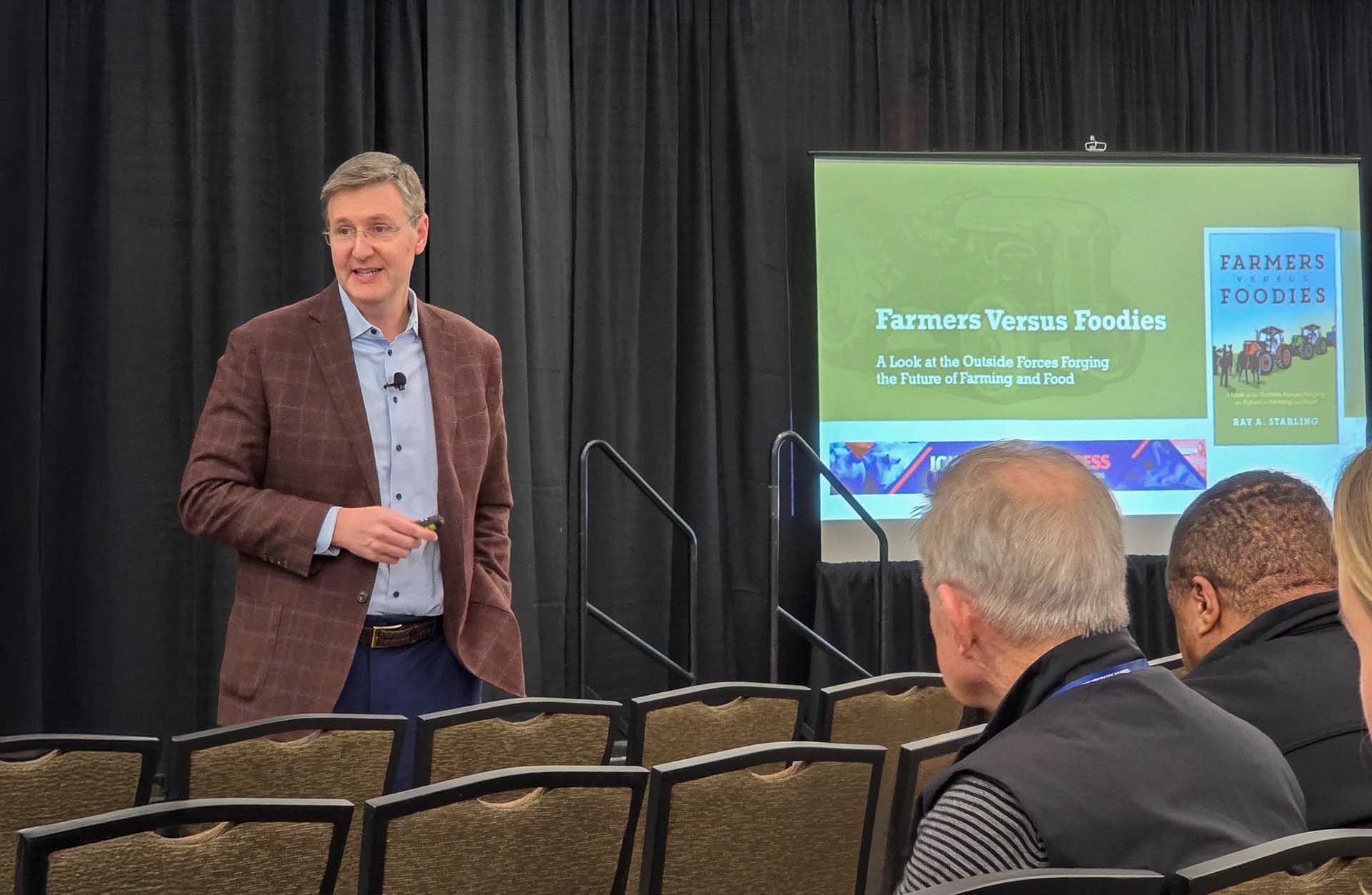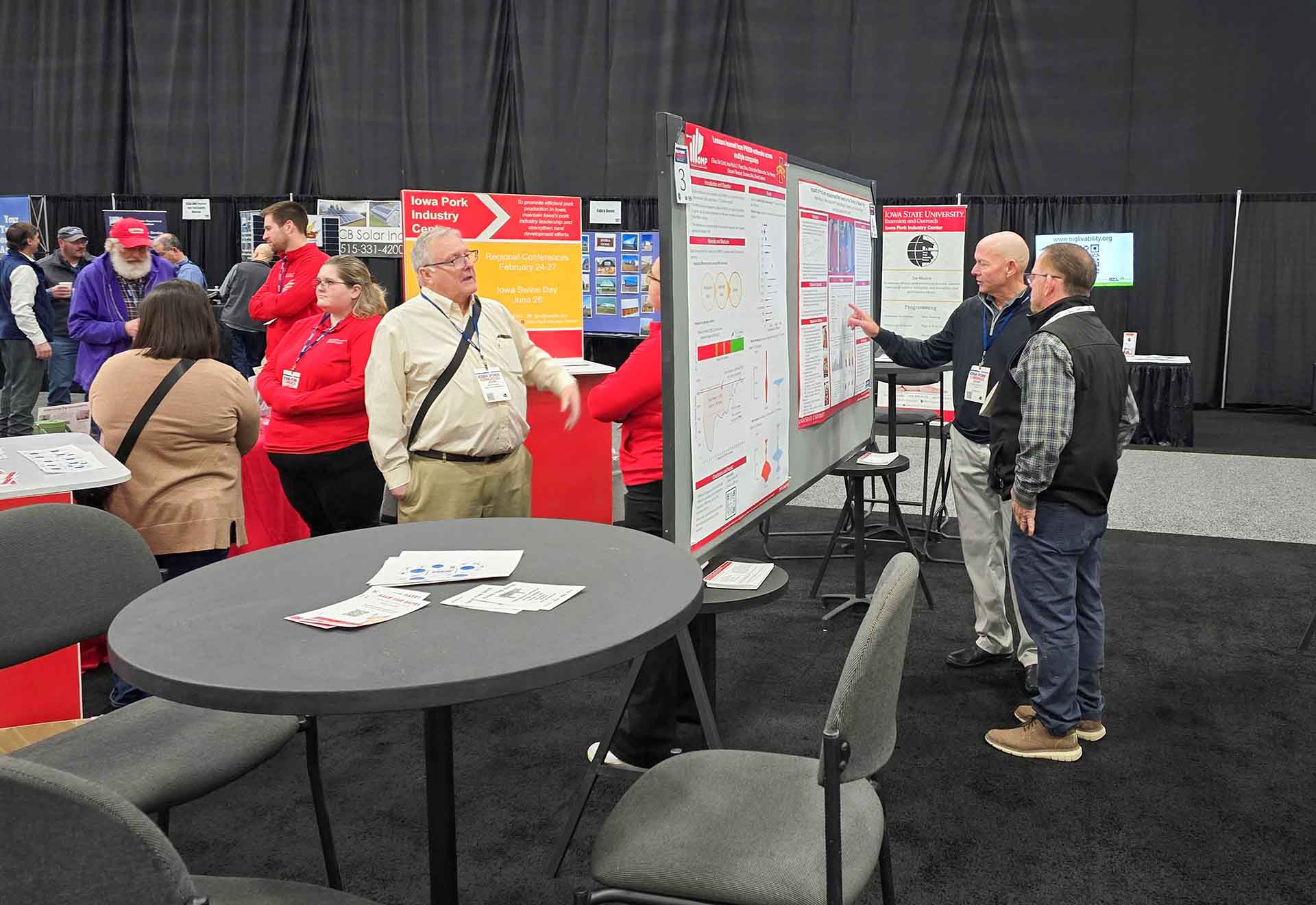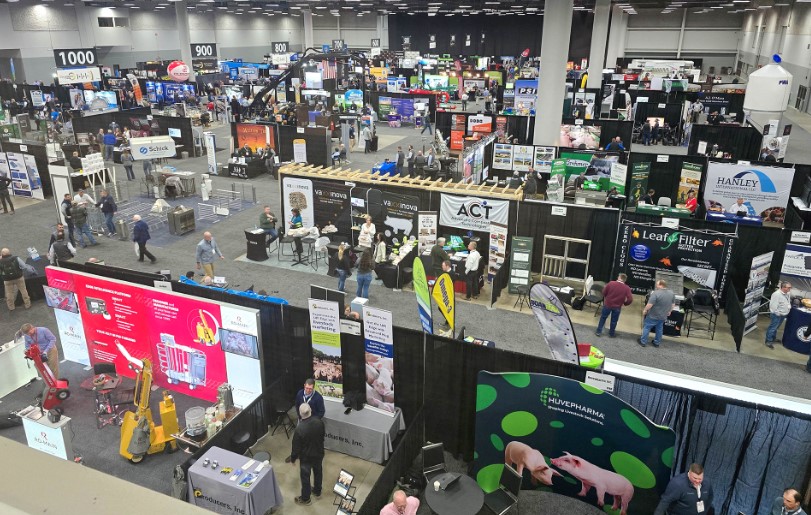
(Photo: Iowa Soybean Association / Jeff Hutton)
Pork producers weigh in on the future of the industry
January 23, 2025
Outsiders, who have no direct connection to agriculture, are influencing how farmers do their jobs. Their demands on the U.S. farming system are hurting both farmers and consumers.
That was one of the messages shared during this year’s Iowa Pork Producers Association’s (IPPA) Iowa Pork Congress in Des Moines this week. Nearly 4,500 attendees, 250 exhibitors and numerous speakers shared their ideas and concerns about the current state of the pork industry.
‘Farmers vs. Foodies’
Ray Starling, the chief of staff to former U.S. Agriculture Secretary Sonny Perdue, says outsiders are influencing the future of the U.S. farming and food system, sometimes to the detriment of farmers and consumers.
“American producers do a phenomenal job on the farm, but they are susceptible to a growing cadre of ‘foodies’ who are shaping public policy and the law around agriculture,” he says.
Starling, now the executive advisor for Directions, Inc., and the general counsel for the North Carolina Chamber of Commerce, outlined several ideas from his recent book, “Farmers vs. Foodies.”
In the book and during his presentation to Iowa pork producers, Starling says policy is being shaped by those folks who don’t understand farming and the demands they’re asking of producers.
Some consumers, the business community, trade associations, activist groups, think tanks, environmentalists, the medical industry and more are pointing fingers at farmers and the ag industry, claiming the U.S. food system is broken.
“If you Google that statement – the food system is broken – somebody is literally paying people to say that,” Starling says, adding the rhetoric has gotten louder over the years.
“I think that’s poppycock,” he says. “We’ve tracked the statistics since World War II – our inputs are relatively static, but we’ve doubled the output since then.
“We’ve gotten better and better at raising crops and livestock. Of all the large industries, agriculture has excelled more than any other industry.”
Whether it’s bushels of soybeans and corn per acre, or the number of pigs, poultry and cattle, American farmers are producing much more, Starling says.
“And (as consumers) we spend the least on food compared to any other country in the world,” he says, pointing to the efficiency of farmers and the work they do.
Starling, however, says views on American farming, are being shaped by those who have never stepped foot on a farm or understand the complexities of farming in today’s environment.
“They want more from us,” he says.
And these divergent points of view are not being mandated by rural vs. urban arguments, not old vs. young or even Democrats vs. Republicans.
“It’s really just insiders vs outsiders – people who know what it’s like to lay in bed knowing that if it doesn’t rain in the next day or two, I’m not going to have a crop, vs. people who have never had to worry about those issues,” Starling says.
He says outsiders are leveraging the system with their voices and legal challenges.
“Their voices are stronger and louder than ours,” Starling says. “The irony is that they know less and less about the agriculture industry, forcing us to do things their way.
“Their views are so far divorced from what is true about agriculture.”
And those outsiders have financial power, hiring lawyers to challenge farmers on how to operate, thus creating the narrative that the food system is broken.
Attorneys are not only going after farmers and the industry as a whole, Starling says, but helping craft policy from individual state mandates like Proposition 12 in California to work on past and future farm bills.

The threat within and speaking out
Starling says threats from these outsiders are even coming from within the new Trump administration, specifically that of Robert F. Kennedy Jr., the current nominee to lead the Department of Health and Human Services.
Kennedy, a vocal critic of American farming, vaccines and other issues, says the U.S. pork industry is a greater threat than Osama bin Laden was, Starling asserted.
“I’m really nervous about his nomination,” he says. “I’m hoping the U.S. Department of Agriculture will be able to contain him.”
Starling says pork producers and all farmers have to lean in and speak out on what’s good about the American food system.
“We’ve got to get this right because the things they are asking us to do will cost money,” he says. “What they are asking will make food more expensive and scarcer. We have the moral high ground here. We know what we’re doing, and we must be on the winning side of these arguments.”
Starling says farmers, politicians and anyone who sits down to eat a satisfying meal during the day need to remember the words of famed politician and orator William Jennings Bryan who sought the presidency in 1896:
“Burn down your cities and leave our farms, and your cities will spring up again as if by magic. But destroy our farms and the grass will grow in the streets of every city in the country.”
Pork producer perspective
Nick Langel, a pork producer and row crop farmer from Le Mars, says attending this year’s event was illuminating.
“This is my first time coming,” he says. “There is so much that you can learn here – lots of information and resources.”
Langel, whose father, Gary, served as the Iowa Soybean Association president in 1997, echoed the concerns of many pork producers who have been challenged by market numbers and policy demands impacting their farms the past few years.
“With the way the industry is going, I see it as being a tough road for a while,” he says. “But we always adapt and overcome.”
Langel says he’s driven to be successful.
“If you’re a farmer and you’re in this industry, you have to be passionate and do it because it’s what you love to do,” he says. “I grew up on the farm and it’s the only thing I’ve wanted to do. You spend a lot of time and make a lot of sacrifices, but I don’t know what else I would do.”
For Langel, events like the Iowa Pork Congress are a testament to what’s important.
“Knowledge is key when it comes right down to it,” he says. “We need to teach our kids where their food is coming from and promote our products. I hope they can retain that information and understand our dedication to taking care of the livestock and the crops. We raise a good product and I’m proud of that.”

New IPPA president
Meanwhile during the event, Carroll County farmer Aaron Juergens assumed the role as IPPA’s next president. He currently manages more than 100,000 nursery and finishing pig spaces for Sunburst Valley Farms near Carroll.
“It’s an incredible honor to lead this outstanding organization and work alongside such a dedicated board of directors,” Juergens said. “This group has always been a source of inspiration for me. I never imagined being elected to serve on the board, let alone as president. It’s truly overwhelming.”
Juergens previously served as IPPA’s president-elect in 2024. He succeeds Matt Gent, a Wellman pig farmer who now holds the position of past president on the IPPA Board of Directors. Juergens expressed his gratitude for Gent’s leadership, noting his ability to navigate the association through a challenging year. Both Juergens and Gent will serve one-year terms in their respective roles.
“Matt did an outstanding job guiding us through a tough year, and I hope to build on his success,” Juergens said. “2025 looks promising, and I’m optimistic about a great year ahead for Iowa pork producers.”
By the numbers
The IPPA also pointed out some numbers from a 2024 Iowa Pork Economic Contribution Study, citing the following facts:
- In 2024, Iowa produced 25 million hogs.
- There are 5,172 hog farms in the state.
- More than 120,200 jobs (full- and part-time) were created by the pork industry including those in hog production, slaughter, processing and related activities.
- $15.4 billion in value-added activity comes from pork production in Iowa.
- $40.5 billion in pork production and processing sales are based in Iowa.
- $8 billion in household income – total payroll related to hog production, slaughter, processing and other related activities. This includes employee wages, salaries and benefits, in addition to payments received by self-employed owners.
- More than 1.5 million acres in soybean consumption is needed to feed pigs raised in Iowa.
- More than 2.2 million acres in corn consumption is needed to feed pigs raised in Iowa.
- The Iowa pork industry generates $915 million in state and local taxes.
- The Iowa pork industry generates $1.8 billion in federal taxes.
Back